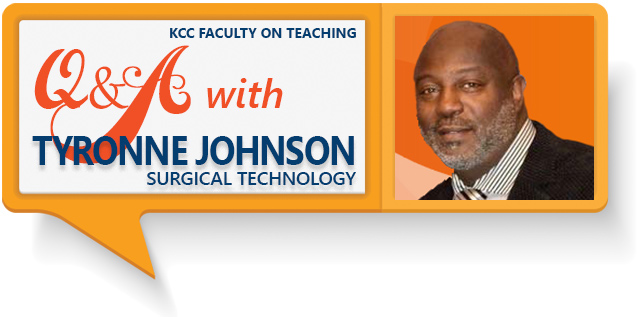KCC Faculty on Teaching
KCC Faculty on Teaching

How did you get into teaching?
My teaching career started while working as a sterile processing director at Flushing
Hospital. I was tutoring sterile processing professionals for their national certification
and fell in love with helping others to learn. While working with my staff, I caught
the eye of the 1199 union. Training my team and helping them all gain their certification
led the union to seek me out to help other individuals who wanted to become certified.
I didn’t know it then, but I’d begun nurturing my passion for teaching.
What career did you imagine for yourself when you were in college?
When I was in college, I imagined I’d become a basketball player, playing for a professional
team. I majored in liberal arts, concentrating in science and mathematics, but I hadn’t
intended on using any of that knowledge. The degree was plan B (or maybe plan C).
My plan A was to be a famous NBA basketball player.
What do you love about teaching?
I love the fact I can help someone change their life. I’ve been teaching surgical
and sterile processing technology for years and have seen my students start their
new careers and gain success. They are buying homes and taking care of their families,
even earning promotions and advancing in the profession. It is the most rewarding
feeling to hear how my students are prospering.
What’s your favorite teaching experience?My favorite teaching experience was teaching under contract for the 1199 SEIU training and upgrading fund. I was able to train many students in many NY State hospitals and met a lot of individuals who wanted to learn. The teaching experience was great because they were as excited to learn as I was to teach.
In what ways do you bring your professional experience into the classroom?
I spent over 25 years as a practicing allied health professional. I share all of my
experience with students entering the surgical technology profession in my classes.
During their clinicals, I show or explain techniques to help them prepare their surgical
set-up more efficiently. I challenge their ability to think critically by placing
them in similar case scenarios I faced as a surgical technologist. I also explain
the evolutionary change to today’s surgical technology.
What advice do you have for current students?
I would advise students interested in any medical field to either volunteer or visit
their local hospital. Most students know about nursing and being a doctor and maybe
even an X-ray technologist, but many students don’t see the other types of allied
health professions that are out there. There are times when I introduce the surgical
technology or sterile processing courses to interested students who didn’t know a
career in the operating room existed. I remember hearing a student say they believed
everyone in the OR needed a minimum of eight to ten years of education just to be
there. So, volunteering or visiting different departments at your local hospital helps.
